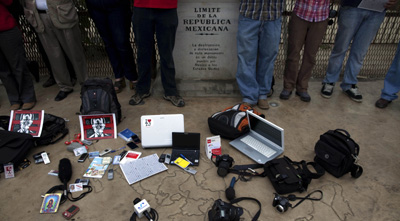Mexican President Felipe Calderón Hinojosa had a message to deliver and it wasn’t about press freedom. After hearing the concerns presented by a joint delegation from CPJ and the Miami-based Inter American Press Association last week, the president wanted us to know something: He didn’t go looking for a fight against the drug cartels.
In my introductory remarks to the president I argued that Mexico’s criminal groups are fighting not only for the control of physical territory but also for control of information in many areas of the country. In this sense, the 30-plus journalists killed and disappeared since the beginning of the president’s term in 2006 are not collateral damage as some have suggested. Rather, the media is a deliberate target in a campaign by criminal groups to dictate what can and cannot be reported in the areas they control.
In response to this press freedom crisis we asked the president to do four things: Push for legislation making crimes against freedom of expression a federal offense; strengthen the office of the special prosecutor charged with prosecuting such crimes; create a government commission to provide security to journalists under threat; and take action to stem abuses against journalists committed by the security forces involved in the fight against organized crime.
The president took detailed notes, distracted only occasionally by a peek at his BlackBerry (Calderón got to keep his!). When he spoke, he did not immediately respond to our concerns. First, he wanted to make a point about the difference between trafficking organizations and organized crime.
Trafficking organizations have long operated in Mexico, the president explained, but their influence on Mexican life was limited because they were focused almost exclusively on control of smuggling corridors. Then, about a decade ago, the situation began to change. Trafficking organizations morphed into full-scale criminal enterprises, branched out into extortion, kidnapping, and selling drugs inside Mexico. Instead of being satisfied with control of a key road or border crossing, they now sought to control entire territories and assert authority over key institutions ranging from municipal governments to the media itself. This was the situation Calderón inherited when he took office, he told us.
Coming from his own perspective on the issue, the president has essentially reached the same conclusion as our delegation. Attacks by organized crime on journalists and media outlets are part of a larger strategy to gain and control territory and represented a serious threat to Mexican democracy and security, one which requires a robust response from the federal government. And he embraced our recommendations on how to proceed.
Working his way through our agenda he promised to push once again for federal legislation criminalizing attacks on freedom of expression, a proposal he first put forward two years ago after a meeting with CPJ. The legislation is currently stalled in Congress. Calderón pointed out that he had broadened the mandate of the special prosecutor for crimes against journalists to include freedom of expression and said he would consider additional reforms. He announced that government had already developed plans for a program to provide physical security to journalists under threat and said he had spoken with former President Alvaro Uribe of Colombia about a successful effort in that country. Finally, he said the military and federal police had improved human rights training and pledged his government would be responsive to concerns raised by journalists about abuses.
These commitments are important, as is the fact that the president spent an hour and half with our delegation responding to our concerns. The meeting was also attended by Interior Minister José Francisco Blake Mora, Attorney General Arturo Chávez Chávez, special prosecutor Gustavo Salas Chávez, and other senior officials. At the same time, there is enormous skepticism among many Mexican journalists about the president’s ability to deliver on his commitments. At a public forum with Mexican journalists from regional media outlets, editors were scathing in their criticism of government efforts thus far.
This month, CPJ released a special report, Silence or Death in Mexico’s Press, which chronicled the devastation wrought by criminal organizations that are targeting the media as well as the weak government response. I presented the report to the president and his cabinet, passing copies around the conference table. I noticed that the reports stopped when they reached the attorney general, who was seated next to the president. I was very pleased, therefore, when as our meeting was adjourned I saw President Calderon lean over and take a copy. He walked out of the meeting with our report under his arm.
(Reporting from Mexico City)
